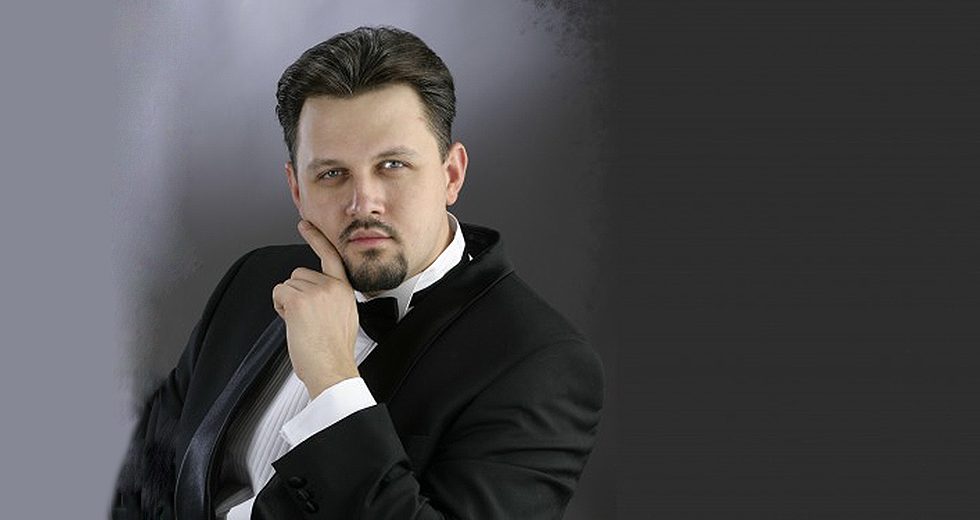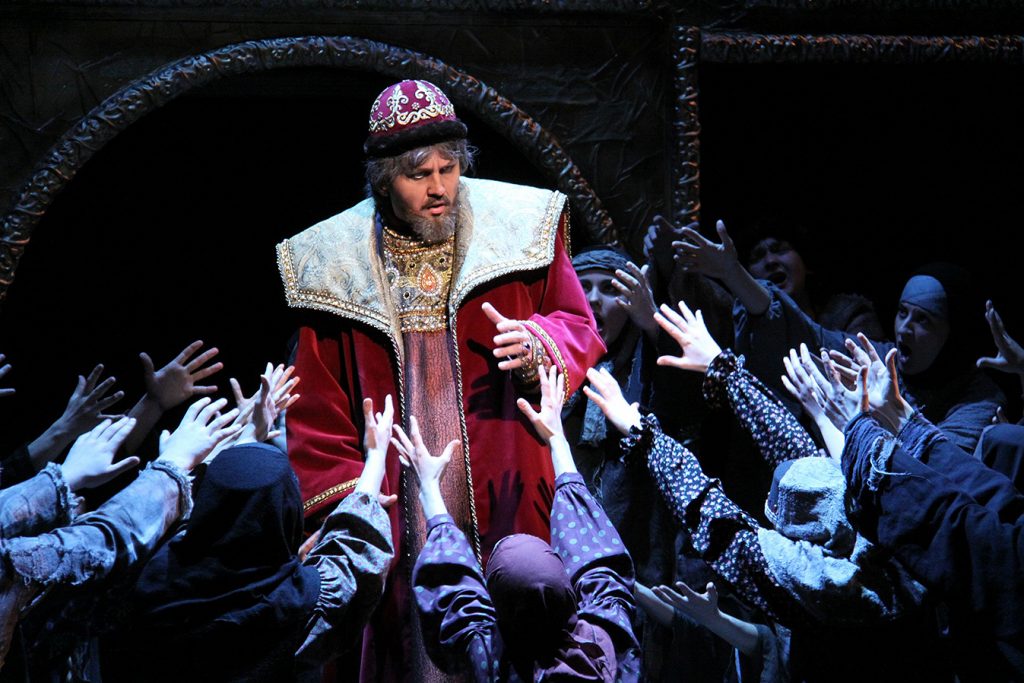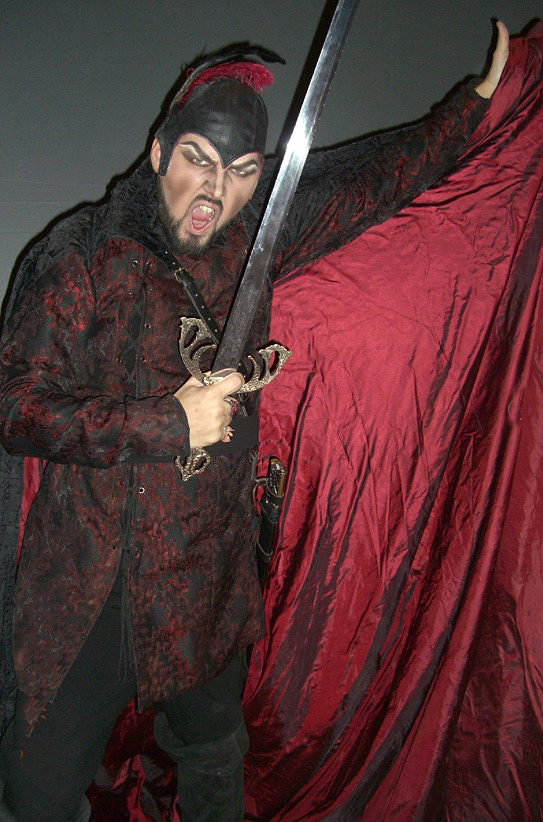
Russian bass Alexey Tikhomirov has built an international operatic and concert career, regularly appearing at the Bolshoi Theatre in Moscow and performing with such companies as the Opera de Lyon in France and the Grand Théâtre de Genève.
The singer will make his Chicago Symphony Orchestra debut in concerts Sept. 21, 22 and 25, serving for the first time as soloist in Dmitri Shostakovich’s Symphony No. 13 (Babi Yar). A kind of choral symphony, the 1962 work includes settings of poems by Yevgeny Yevtushenko concerning the Nazis’ 1941 mass murder of Jews at Babi Yar, near Kiev, and other subjects. Though this appearance marks his first visit to Chicago and the United States, as well as his CSO debut, Tikhomirov has worked before with Muti: at his Rome Opera debut as Agamemnon in Gluck’s Iphigenia in Aulis, in Vienna and at the Salzburg Festival.
Now 39, the bass grew up in Kazan, the capital of the Republic of Tatarstan. After his early musical studies there, he continued his training at the Galina Vishnevskaya Opera Centre in Moscow, which opened in 2002.
In advance of his CSO concerts, Tikhomirov corresponded with Sounds and Stories via e-mail about his thoughts on Russian vocal training, performing with Muti and making his debut in the Symphony No. 13.
Your undergraduate studies were at a conservatory away from the big musical centers of Moscow and St. Petersburg. What were the advantages of beginning your training there?
Kazan is unofficially considered the third capital of Russia. Without a doubt, this is one of the main cultural centers of Russia. I was very lucky to start my musical education in Kazan. There are very strong universities there, as well as an excellent conservatory and music college. Many wonderful teachers have worked in Kazan.

Alexey Tikhomirov considers the title role in Mussorgsky’s Boris Godunov as his favorite: “I have sung this part in all existing [versions] in more than 14 productions in Europe, Russia, Israel and Chile.”
What sets Russian vocal training apart?
As you know, Russian vocal education and art, opera in particular, have a long and rich history and are distinguished by their originality. How many glorious names did the Russian and Soviet schools give to the world? [Many] remember only the great Feodor Chaliapin and Galina Vishnevskaya!
It is very important that in Soviet times teachers were engaged with students not for the sake of high fees or salaries, but for the sake of high vocal results and creative achievements. The financial context remained on the sidelines, while teachers free of charge worked with the students even after hours, overtime. It was a time of real heroes of art.
In Soviet times, the operas of foreign composers were performed in the Bolshoi, Mariinsky, Kazan and other opera theaters mostly in Russian language, which left its historical mark. Due to this, the majority of our countrymen knew the texts and motives of Verdi, Mozart, Rossini and many other foreign composers practically by heart. On the radio there were always operatic classics that everyone knew. Owing to this, classical opera music became close and dear to everyone. It usually was only after the classical (opera) music that the radio and television networks scheduled popular contemporary music.
Vocal singing not only requires impeccable vocal technique, but also needs a complex actor’s approach. Without a special internal performance of living through your hero, without the expressiveness of colors and rich timbral palette, it is impossible to be a full-fledged singer.
When and where did you make your professional debut?
My first performance took place in the third year of the conservatory in 2003 when I starred as Donizetti’s Don Pasquale. It was conducted by Fuat Mansurov, a renowned conductor of the Bolshoi and the Kazan opera theaters.
Do you have a “home” opera house — one where you return regularly?
It is very necessary for a singer to have such an opera house where he is always expected! Where he is always welcome and where the audience buys out tickets to his performances in advance and the management is proud of him. I luckily have such home theaters in Moscow, one being the Helikon Opera, where, under the direction of Dmitry Bertman, I have been performing all the leading roles since 2005. The other is the Novaya [New] Opera Theatre, named after Eugene Kolobov. I also worked at the Bolshoi Theatre in 2011-2016.
What are some of your favorite operatic roles?
My most favorite and in-demand part in the world is Boris Godunov; I have sung this part in all existing editions in more than 14 productions in Europe, Russia, Israel and Chile. My second favorite is Mephistopheles in Gounod’s Faust. I also regularly perform this role.

Alexey Tikhomirov (here as the Devil in Faust) likes playing the villain: “I love to do such roles! [Villainous] characters, in my opinion, are more interesting.”
I love to do such roles! Negative characters, in my opinion, are more interesting to perform. They usually represent many more remarkable traits and charisma, and the public never leaves them unnoticed, often thanking performers of such characters with standing ovations.
Such roles as Mephistopheles in Gounod’s Faust, Wurm in Luisa Miller, Galitsky in Prince Igor and Sparafucile in Rigoletto give much more space and freedom for acting, imagination and expressing vocal colors than do positive characters like Zarastro in The Magic Flute or the King of Egypt in Aida. The latter are almost devoid of fire and drive.
You have sung several times with Riccardo Muti. How would you describe him as a conductor and collaborator?
Yes, to my great happiness, I have performed under the direction of Maestro Ricardo Muti. I must say that since my debut with Maestro in 2009 at the Rome Opera as Tsar Agamemnon in Iphigenia in Aulis, my international professional career really has begun. I remember our first rehearsal in Rome as if it were yesterday. It’s in my memory as the most important exam of my professional life.
I learned what it means to perform with the great Muti! This is a huge responsibility. He is monumental, strict, loves talent, does not recognize laziness and lack of zeal in the work. Stern and at the same time paternal, taking real care of his singers. As my great friend, bass Ildar Abdrazakov, once put it: “Maestro Muti is like an artistic father for us singers.”
How are you anticipating your debut with the CSO?
It is a great honor for me to perform Shostakovich’s 13th Symphony with the Chicago Symphony Orchestra, one of the best in the world. And of course it’s my great happiness that that the great Muti will be behind the console.
What challenges does the Symphony No. 13 present to the vocal soloist?
The performance of Shostakovich’s Symphony No. 13 requires the soloist to sing for almost the entirety of the work. For about an hour, he must demonstrate different vocal techniques. The bass part is written in a very high register and leaves practically no room [pauses] for the voice to rest.
What is also challenging about this symphony is its requirements for timbral colors: the performer needs to change the sound from heroically pathetic to subtle and soft pianissimo, from tragic to comic. The whole palette of colors is used. The work of the vocalist is also interesting as a storyteller who captivates and carries away the viewers with his narration.